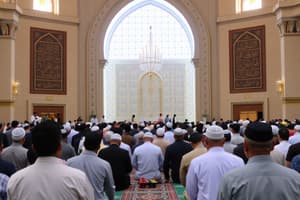Podcast
Questions and Answers
Which of the following best describes the Islamic concept of worship ('Ibadah)?
Which of the following best describes the Islamic concept of worship ('Ibadah)?
- Strictly limited to acts performed in mosques and religious gatherings.
- Encompassing all actions done with the intention of seeking Allah's pleasure. (correct)
- Centered on personal spiritual growth, excluding societal contributions.
- Primarily focused on performing specific rituals at designated times.
What is the significance of 'Niyyah' (intention) in Islamic worship?
What is the significance of 'Niyyah' (intention) in Islamic worship?
- It is only essential for major acts of worship like prayer and fasting.
- It distinguishes acts of worship from mundane activities. (correct)
- It is solely related to seeking personal development but not societal harmony.
- It is a recommended but not obligatory aspect of worship.
Why is 'Conformity to the Sunnah' important in Islamic worship?
Why is 'Conformity to the Sunnah' important in Islamic worship?
- It is a secondary aspect of worship, not as important as sincerity.
- It is only relevant to acts of worship performed in a communal setting.
- It allows for innovation and personal interpretation in religious practices.
- It ensures that worship is performed in accordance with the Prophet Muhammad's (PBUH) teachings. (correct)
What does the comprehensiveness (Shumuliyyah) of worship in Islam encompass?
What does the comprehensiveness (Shumuliyyah) of worship in Islam encompass?
How does Islam view the concept of 'Balance' (Tawazun) in worship?
How does Islam view the concept of 'Balance' (Tawazun) in worship?
What is the significance of 'Consistency and Regularity' in worship?
What is the significance of 'Consistency and Regularity' in worship?
How does worship influence an individual's 'Spiritual and Moral' character?
How does worship influence an individual's 'Spiritual and Moral' character?
According to Islam, what foundational role does the family play in society?
According to Islam, what foundational role does the family play in society?
What is the Islamic view on marriage (Nikah)?
What is the Islamic view on marriage (Nikah)?
What are the encouraged outcomes of marriage in Islam?
What are the encouraged outcomes of marriage in Islam?
In an Islamic marriage, what is considered among the husband's duties?
In an Islamic marriage, what is considered among the husband's duties?
According to Islamic teachings, what are the wife's duties within a marriage?
According to Islamic teachings, what are the wife's duties within a marriage?
Which of the following illustrates the mutual rights in an Islamic marriage?
Which of the following illustrates the mutual rights in an Islamic marriage?
In Islam, what is the significance of 'Respect for Parents'?
In Islam, what is the significance of 'Respect for Parents'?
What does 'Childcare and Upbringing (Tarbiyah)' emphasize in Islam?
What does 'Childcare and Upbringing (Tarbiyah)' emphasize in Islam?
How does Islam protect 'Lineage and Inheritance'?
How does Islam protect 'Lineage and Inheritance'?
What is the importance of 'Mutual Consultation (Shura)' in family decisions?
What is the importance of 'Mutual Consultation (Shura)' in family decisions?
Why does Islam emphasize 'Preservation of Modesty and Privacy' in family relationships?
Why does Islam emphasize 'Preservation of Modesty and Privacy' in family relationships?
Which of the following is considered an innovation (bid'ah) in worship?
Which of the following is considered an innovation (bid'ah) in worship?
How does daily life become an act of worship in Islam?
How does daily life become an act of worship in Islam?
Flashcards
Worship ('Ibadah) in Islam
Worship ('Ibadah) in Islam
A central aspect of a Muslim's life encompassing every action done with the intention to seek Allah's pleasure.
Sincerity (Ikhlas)
Sincerity (Ikhlas)
Worship must be done solely for Allah.
Conformity to the Sunnah
Conformity to the Sunnah
Acts of worship must follow the Prophet Muhammad's (PBUH) way.
Comprehensiveness (Shumuliyyah)
Comprehensiveness (Shumuliyyah)
Signup and view all the flashcards
Balance (Tawazun)
Balance (Tawazun)
Signup and view all the flashcards
Consistency and Regularity
Consistency and Regularity
Signup and view all the flashcards
Spiritual and Moral Impact
Spiritual and Moral Impact
Signup and view all the flashcards
Family in Islam
Family in Islam
Signup and view all the flashcards
Marriage (Nikah) as the Foundation
Marriage (Nikah) as the Foundation
Signup and view all the flashcards
Husband's Duty (Nafaqah)
Husband's Duty (Nafaqah)
Signup and view all the flashcards
Wife's Duties
Wife's Duties
Signup and view all the flashcards
Mutual Rights
Mutual Rights
Signup and view all the flashcards
Respect for Parents
Respect for Parents
Signup and view all the flashcards
Childcare and Upbringing (Tarbiyah)
Childcare and Upbringing (Tarbiyah)
Signup and view all the flashcards
Protection of Lineage and Inheritance
Protection of Lineage and Inheritance
Signup and view all the flashcards
Mutual Consultation (Shura)
Mutual Consultation (Shura)
Signup and view all the flashcards
Preservation of Modesty and Privacy
Preservation of Modesty and Privacy
Signup and view all the flashcards
Study Notes
- Worship in Islam is a central aspect of a Muslim's life, encompassing every action intended to seek Allah's pleasure.
- Islam views worship ('Ibadah) as a means of personal development, spiritual growth, and societal harmony.
Key Characteristics of Worship in Islam
- Worship must be done solely for Allah, requiring sincerity (Ikhlas).
- Intention (niyyah) is crucial in all acts of worship.
- Conformity to the Sunnah requires acts of worship to follow the Prophet Muhammad's way.
- Innovation (bid'ah) in worship is not accepted.
- Comprehensiveness (Shumuliyyah) includes rituals (prayer, fasting) and daily actions (earning a halal income, helping others).
- Life itself is seen as an act of worship when done in obedience to Allah.
- Balance (Tawazun) in Islam must be achieved between body and soul, individual and society, and fear and hope in Allah.
- Consistency and Regularity dictates that worship is a constant part of life, not seasonal or occasional.
- Daily prayers (Salah), annual fasting (Ramadan), and other regular worships exemplify consistency.
- Worship purifies the soul, develops good character, and discourages evil, creating a spiritual and moral impact.
Islamic System: Family System in Islam
- The family is the foundation of Islamic society, fostering a strong, moral, and caring structure.
Key Features of the Islamic Family System
- Marriage (Nikah) is a legal contract and a sacred bond.
- Marriage helps to preserve chastity, promote love and compassion and establish a family.
- Husbands have the duty to provide financial support (Nafaqah) and be kind and just.
- Wives have the duty to maintain the household, and uphold family values.
- Mutual rights include respect, love, support, and faithfulness.
- Parents are respected and obeyed.
- Childcare and Upbringing (Tarbiyah) emphasizes teaching children faith, morals, and responsibility.
- Both parents are responsible for guiding their children in Islam.
- Protection of Lineage and Inheritance safeguards family lineage through legal marriage.
- Clear rules of inheritance ensure fairness and justice.
- Family decisions should be made through discussion and mutual consent (Shura), especially in important matters.
- Islamic family values modesty, honor, and privacy in relationships.
Studying That Suits You
Use AI to generate personalized quizzes and flashcards to suit your learning preferences.





